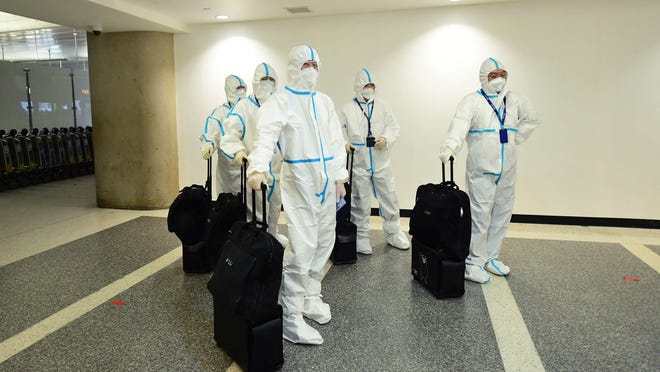
Many people have caught COVID-19 over the past 20 months, despite their best efforts, or because they didn't take enough precautions against the coronavirus.
Data is just starting to emerge about how protected they may be against another infection.
As with most illnesses, contracting COVID-19 provides immune "memory" that helps protect against a future infection. But it's still unclear how sick a person has to get with COVID-19 to develop enough immune memory to be protective and for how long. That's why the Centers for Disease Control and Prevention recommends even people who have had COVID-19 get vaccinated against it.
A growing body of research suggests infection plus vaccination provides the strongest protection against a wide range of variants, possibly for a long time.
People who were infected and then vaccinated some months later have "what's called 'hybrid immunity,' which is like super-immunity," said Warner Greene, a virologist at the Gladstone Institute in San Francisco.
This combined protection seems to last a long time, according to a new study in the journal Science. It may last far longer than vaccination alone, he said, though that hasn't been proven yet.

Greene warns against seeking out infection to get such good protection, though. Severe disease is no fun and can strike anyone.
Infectious disease expert Dr. Monica Gandhi said public health officials too often downplay the protection provided by infection.
"To deny natural immunity does not generate trust," said Gandhi, an infectious disease expert at the University of California, San Francisco and San Francisco General Hospital.
Getting vaccinated three months – or even better, six months – after infection provides the best possible protection, she said. But adding a second shot offers almost no additional benefit over the first, nor do people who have been fully vaccinated and infected need a booster at this point.
"If you're naturally immune, get one dose," Gandhi said.
In a new study from the Rockefeller Institute in New York, researchers found that people who get vaccinated after catching COVID-19 may be protected against a wider range of variants than people who get vaccinated alone.
Still, said Theodora Hatziioannou, an author on the study, if you have to pick one, go with vaccination.
Shots, she said, lead to higher levels of neutralizing antibodies, naturally made substances that fight an infection. Neutralizing antibodies wane with time, so the more you start out with, the better.
"At five-six months post-vaccination or infection," she said, "the vaccinated participants had overall higher levels of neutralizing antibodies than the infected, including against variants."

Unanswered questions
There are still open questions when it comes to natural immunity and the protection it affords.
It's not clear, for instance, how soon someone can get infected with COVID-19 a second time.
The CDC "is actively working to learn more about reinfection to inform public health action," according to spokesperson Kristen Nordlund. "This is a priority area of research for CDC."
For young, healthy people, an infection may provide 80% to 90% protection against a reinfection, she said. But in older adults and those who are immunocompromised, an infection may be less protective.
In Denmark, for instance, of nearly 12,000 people who tested positive during the first wave of coronavirus infections last year, more than 80% were protected in the second surge. But among those 65 and older, protection against repeat infection was only 47%. Protection didn't seem to fade over time.
Milder or asymptomatic infections may provide less protection than severe ones.
Unvaccinated people who had COVID-19 are more than twice as likely as fully vaccinated people to get COVID-19 again, Nordlund said.
Studies are still being done, she said, to better understand whether repeat infections are milder than initial ones.
"One would expect so," Hatziioannou said. "The immune responses developed during the first infection should offer some protection against severe symptoms the second time around."
But variants might make a difference. For example, she said, blood from people previously infected with the so-called beta coronavirus variant might not be able to fight the delta variant as well as people infected with the virus in its original form.
Jeffrey Shaman, an infectious disease epidemiologist at Columbia University's Mailman School of Public Health, said it's frustrating to be this far into the pandemic and still have so little understanding of repeat infections.
Though it should be relatively easy to count how many people get infected after vaccination – data the CDC stopped collecting this spring – it's much more challenging to learn how many people are getting repeat COVID-19 infections.
If they're not very sick, he said, they are unlikely to report those infections.
Early studies suggested some people were developing different types of immune responses to infection, he said. Some developed protection against the virus' spike protein, the same target of vaccines. They seemed less likely to develop a repeat infection.
But it's possible that as the virus that causes COVID-19 continues to evolve, another variant will come along and people whose immune systems responded to a different part of the virus will be better protected, he said.
Dr. Robert Glatter, an emergency physician at Lenox Hill Hospital in New York City, said he worries about patients who had a severe reaction to COVID-19 the first time.
He has seen a number of patients whose symptoms are worse with a second infection, perhaps because they have immune cells that are "primed to respond in an exaggerated or more aggressive fashion during a reinfection."
Countries that have tried to rely on natural infections to slow the spread of the virus, such as Brazil and Iran, "have not prevented recurrent waves of infection," Glatter said.
"There is no country in the world where natural infection and natural immunity has slowed the pace of the pandemic or helped to bring it under control."
Contact Karen Weintraub at [email protected].
Health and patient safety coverage at USA TODAY is made possible in part by a grant from the Masimo Foundation for Ethics, Innovation and Competition in Healthcare. The Masimo Foundation does not provide editorial input.
Source link








